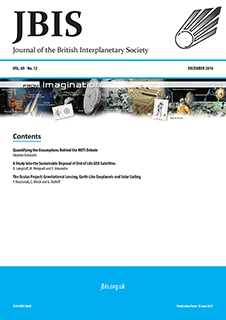= ASTRONAUTICAL EVOLUTION =
Issue 134, 17 July 2017 – 48th Apollo Anniversary Year
| Site home | Chronological index | About AE |
Quantifying the Assumptions Behind the METI Debate
Summary
My latest contribution to the Journal of the British Interplanetary Society (JBIS) discusses the controversial topic of METI – Messaging to hypothetical ExtraTerrestrial Intelligence. It offers an analysis of the probability that a signal from Earth directed at another star might impinge upon a resident alien civilisation, and a discussion of how dangerous that might be for humanity.
Assuming that a civilisation exists there, capable of receiving our signal, it may fall into one of two possible cases. It may be planet-bound, as we are, in which case it may or may not choose to signal back to us. Or it may have developed interstellar travel, or at least be able to transmit its physical influence in some way over interstellar distances, for example by a small (~ grams to tonnes) robotic probe. In the latter case, it may be of material benefit to us, or it may equally pose a material threat.
My finding is that the probability of such a civilisation existing in our galactic neighbourhood (defined as a sphere of radius 500 light years centered on the Sun) is very small, on the order of one in a million. Since there are about a million stars within the galactic neighbourhood thus defined, the probability per star is one in a trillion.
Clearly the probability that, if it exists, such a civilisation will pick up a METI or other signal from Earth is also small, though unquantifiable, since it would not be rational for it to set up large radio telescopes to stare continuously at the Sun over geological periods of time (up to hundreds of millions of years) on the off-chance that a transmitting species might evolve during that period. Earth has possessed a land surface and oxygenated atmosphere, suitable for such a species to evolve and detectable over interstellar distances, since the Devonian period, some 400 million years ago.
The deliberate transmitting of signals to other stars where no alien civilisation has yet been identified (currently all of them!) is therefore not recommended, partly because the chance of the signal being received is extremely low, and partly because, in the highly unlikely case that it is received, humanity will have squandered a period of time which could easily be several thousand years, during which time it might have matured to meet the aliens on equal terms.
In a nutshell
Even without reading through my paper’s 10 pages in full, the basic situation is easy to explain. Either industrial civilisations like our own develop into interstellar civilisations, with a certain frequency of success (say 1 in 1000 per thousand years of their existence), or they do not.
If they do not, then interaction among them is only possible using long-range signalling. While some have suggested that such signalling might damage us through culture shock, my paper mentions several instances of arguably more severe culture shock which have appeared in human history without interrupting human progress in the least.
METI is therefore only potentially dangerous if there is at least one other civilisation out there which is agressively expansionist, has developed interstellar reach, and can potentially access the Solar System with physical vehicles, or with targeted high-power electromagnetic or particle beams.
Some have proposed that such extraterrestrials are lurking unseen, watching and waiting, ready when they receive our signals to leap out of their concealed lairs to come and destroy us. We would therefore subject ourselves to existential risk if we dared to “shout in the jungle” – with possibly disastrous consequences…
But is this remotely plausible? It is not. It requires the aliens to refrain from any access to or use of the materials and energy in our Solar System, and in millions of similar systems, for periods of millions to billions of years, on the off-chance that a human-like species might evolve, and only then moving in for the kill. They would wish to destroy us, not because they wanted to use our resources, but merely because they were evil and that is what evil aliens do.
Meanwhile, it’s perfectly clear what life does in reality: it spreads wherever it finds the opportunity to do so. That is how it’s always been on Earth, and unless the nature of life changes drastically on a cosmic scale (which nobody to my knowledge has had any defensible reason to suggest), that’s how it will be in the Galaxy.
In fact, were the aliens to refrain altogether from interstellar colonisation, the immense distance separating them from us (from tens to tens of thousands of light years) would prevent any physical contact. Whereas if they were to embark on expansion, both developing the technologies for physical contact and ensuring that their nearest base was within close range of the Solar System, natural selection would ensure that all systems were occupied within a short time on the galactic timescale (on the order of tens of millions of years, thus within one per cent of the age of the Galaxy).
Long eons before any lurking destroyer aliens have detected the presence of industrial mankind, another branch of their civilisation, or a branch of a different family of civilisations, will have occupied the Solar System and made it their home. Which clearly they have not.
Therefore, METI can only be dangerous to us in the statistically improbable scenario that our civilisation is second to industrialise in the Galaxy by a margin of less than a few tens of millions of years, that the older civilisation is embarked upon aggressive interstellar colonisation, that it has reached our galactic neighbourhood (within about 500 light years) but not yet arrived in the Solar System, and that it happens to be observing our system closely at the right time to intercept a message from Earth.
This is perfectly possible. Sometimes improbable things happen. But without any further observational evidence that such an older civilisation exists, that improbability is not a rational basis for either embarking on a programme of transmitting METI signals to stars with likely-looking planetary systems and waiting decades to centuries for a reply, or worrying too much about the possible evil consequences of that reply. There are more immediate issues for us to concern ourselves with!
Non-subscribers to JBIS can download a copy of my paper from the JBIS website for the extremely modest sum of £5.00 (which will go to help the British Interplanetary Society).
Please send in comments by e-mail.
Interesting and relevant comments will be added to this page.
| Site home | Chronological index | About AE |


